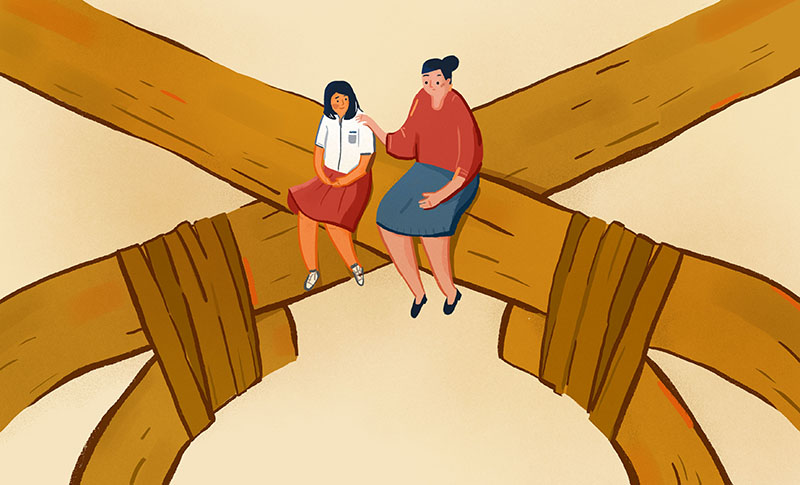A rough start
On his first day of primary school, Kwek Hiok Chuang was anxious to find his mother. In between lessons, he stood up and peered through the classroom windows, hoping to pick her out from the mass of parents in the corridor.
For failing to snap to attention when a teacher entered the class, he was sent to the corner of the room, forearms crossed over his chest, hands pulling his ears. He remained there for the entire period.
It has been over 50 years since that incident. Mr Kwek went on to have a long career as a teacher himself, and recently retired as Principal of Nanyang Junior College. But he never forgot what happened on his first day as a student.
His anecdote is not uncommon. Singaporeans who attended school between the 1960s and 1980s may recall other ways teachers commanded obedience: using a ruler to whack the arms of talkative students, tossing chalk at those not paying attention.
Now: Gentler measures
Today, however, educators are far more reluctant to use corporal punishment, particularly for minor offences.
Flipping through the discipline guidelines for Unity Primary School, recently-retired Principal Jasmail Singh Gill points out that most of their measures are verbal in nature. Initial offences for late-coming and improper attire are dealt with through counselling by a teacher, and parents being informed. Subsequent offences could result in reduced playtime during recess and students reflecting on their behaviour.
At Changkat Changi Secondary School, students are rarely even sent for detention. Their Principal Sharma Poonam prefers that they do something constructive with their time, so offenders work with teachers or the school’s Discipline Committee to clean or spruce up parts of the school. “If students see that they can do something positive for the school, they can also do something positive for their lives,” she says.
Restoring order, peacefully and quickly
Even when students err in their behaviour, they may not necessarily be punished. Greenwood Primary’s Principal Cheryl Foo recalls a boy who pushed a classmate over for encroaching on his personal space. Their teacher quickly restored order and informed the school counsellor. Within the same day, all four of them were seated in a circle in the counselling room.
The boy was invited to explain his actions, and reflect on how they may have affected his classmate. The classmate was asked to think about what it meant to respect the boy’s space. Their teacher shared her feelings about having her lesson disrupted by the incident. Eventually, an understanding was reached, and the teacher shared the learning points with the rest of the class.
This approach—formally known as Restorative Practice—involves getting students to fix a problem they caused, work out how to prevent further infringements, and reconcile with those who have been affected by their actions.
Ms Foo favours this because she believes that many children who break school rules may actually be calling out for attention. “The child who needs the love most will likely show it in the most undesirable way,” she says. Hence Greenwood’s approach of disciplining with love, care, and dignity.
Her counterpart in Yio Chu Kang Secondary echoes this sentiment. “Education is a people-changing business,” says Mrs Carol Lim. “We need to see the human side of the child.” She acknowledges that this is a shift from decades ago, where discipline was used primarily to maintain order in the classroom.
Complex times, complex methods
While being educative, some parents may wonder why schools adopt such a light touch today. Have they gone soft?
No, say principals. They believe that schools have simply evolved to meet changing social needs.
Mr Chua Choon Guan, Principal of First Toa Payoh Primary School, grew up in a family of 12 children in the 1960s. Back then, some teachers would punish students without informing parents, and students themselves would try their best not to let their parents know, lest they receive more punishment for bringing shame to the family.
“With family sizes coming down, there is greater parental involvement in every child’s education. It’s a reality that everyone who becomes a teacher must accept,” he says.
Beyond that, discipline issues happen for a variety of reasons. A habitual late-comer could be a computer game addict from a middle-class family, or a responsible elder brother who escorts his sibling to another school each morning because their parents are working overnight shifts. A smoker could be a teenage rebel, or someone who puffs with his parents as a regular bonding activity.
Ms Sharma believes this is why schools refrain from immediate punitive action whenever an offence is caught. “We do not decide on disciplinary actions flippantly,” she says. “We want to understand the circumstances. We really put in a lot of work, getting eyewitness reports; looking at student dossiers to see if they have committed similar offences before; speaking with their teachers and parents.” Because schools are committed to such thorough investigations, Mr Chua hopes that parents can “trust the school to do what is right for the child.”
To educators, the point is not how a child is punished, but that the child learns from the experience. “Just because we don’t twist students’ ears anymore, does not mean we have gone soft. We are firm,” says Mrs Gill. She would rather her students be “guided by values” than “guided by fear of punishment.”
Not just talk
But this does not mean that discipline these days is all talk. Caning remains an option, though it is only considered for severe and repeated offences, and after all other options have been exhausted. Offenders are always warned well in advance that certain actions of theirs could lead to caning. Once the measure is decided on, parents are always informed in advance.
One group that is often left out of the loop, though: other students.
While public canings were not uncommon before, these days the strokes are usually administered by the Discipline Master behind closed doors, in the presence of the form teacher, school counsellor, Principal and/or Vice-Principal. It is possible that a student may be caned for an offence without his classmates knowing.
The main reason for this is the child’s dignity. “We’ve got to respect the child,” says Ms Sharma. “Mistakes can happen—they’re still young! We don’t need to publicise the disciplinary actions to the extent that everyone knows.” Even if a child has bullied other students, and parents of the victims demand to know how the school is dealing with it, they may not get an answer. “We hope parents can understand that by probing, they may make the child a victim as well,” Ms Sharma adds. “The school is a safe place. If children make mistakes, they still have an opportunity to learn, and make things better. Society is not so forgiving.”
Maintaining dignity
Sometimes, students are aware that their classmate has been disciplined. At Unity Primary School, a particularly disruptive child committed a series of offences that culminated in him being suspended from class for two weeks. He had to report to the school office each morning, where he would quietly do homework until dismissal. His behaviour improved, but Principal Mrs Gill was concerned that he would be ostracised by his classmates when he returned. “What can we do so he feels that he’s forgiven, and that the class accepts him back?” she asked the boy’s teacher.
The teacher then spoke with the class, explaining why their friend had been suspended, that he was remorseful for what he did, and that it was important for everyone to move on. Each pupil wrote a personal message to the boy, folded it and placed it in a little box. On the day of his return, Mrs Gill escorted him to class, and one of his friends received him at the doorway. The boy went to the front and apologised to the class for his disruptive actions. “The teacher handled this very well. The class accepted the boy back, and I am so proud of them for that. What had it taught them? Forgive, forget, learn, move on.”




.jpg)

